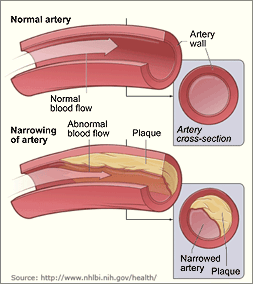What is cholesterol and why is is it of concern to our health?
Posted in General Health & Wellness on August 4, 2011. Last modified on February 01, 2018. Read disclaimer.

Cholesterol is a waxy, fat-like substance naturally made by the body and used in the production of hormones, bile acids, vitamin D and digestion of fatty foods.
All that most of us know about cholesterol, however, is that -- when we have too much of it, cholesterol can build up in the arteries. This makes it harder for blood to flow and increases our risk of stroke and heart disease (the leading cause of death in America).
There are two primary types of cholesterol to be aware of:
LDL or "bad" cholesterol: LDL cholesterol carries cholesterol TO the tissues. Unfortunately, this form of cholesterol joins with fat, calcium and other blood substances to form plaque which hardens and narrows artery walls.
HDL or "good" cholesterol: HDL is "good", not only because it does not cause damage, it also delivers cholesterol AWAY from the tissues to the liver where cholesterol gets eliminated from the body.
What's worse, saturated fats or trans fats?
While both should be avoided or minimized, trans fats deliver a double whammy. Saturated fats raise good AND bad cholesterol while trans fats raise only the bad.
On the other hand, trans fats are easier to avoid since they are found less often in staple foods and usually in smaller amounts. The average diet includes 6x as much saturated fats as trans fats.
What determines how much "bad" and "good" cholesterol we have? Are LDL and HDL levels something we can control?
While our bodies produce sufficient quantities of cholesterol naturally, lifestyle choices can raise our cholesterol levels faster than the body is able to break the cholesterol down. Diet is one of such factor.
Foods to be concerned about include those that are high in...
- dietary cholesterol (such as egg yolks, meat and dairy products)
- saturated fats (primarily animal-based foods such as fatty cuts of meat, poultry skin, butter, cheeses, lard. Some tropical plant foods such as palm kernel and coconut oil, that are commonly found in snack foods, are also high in saturated fats)
- trans fats (vegetable oils that have been altered during processing. Trans fats are found primarily in some shortening, margarine, snack foods, fast foods and baked goods)
- triglycerides (triglycerides are a necessary fat, again, naturally produced by the body. Smoking, sedentary lifestyle, obesity, drinking alcohol and eating foods high in simple carbohydrates -- like candy and sodas, however, can cause us to have unhealthy triglyceride levels)
The good news is that there are also foods can help us decrease our total cholesterol, bad LDL cholesterol and triglycerides while increasing good HDL cholesterol levels.
+ Free Shipping & Returns on Eligible Items.
(*Amazon's Top 100 list updated hourly.)
Foods providing us cholesterol benefits include those that are...
- high in monosaturated fats (such as in olive oil and high-oleic safflower oil)
- high in polyunsaturated vegetable oils (such as flaxseed, walnuts, and canola and soy oils)
- high in polyunsaturated fish oils (such as in salmon, sardines and trout)
- low in dietary cholesterol and saturated fats (such as vegetables, fruits and whole grains)
My neighbor ate lots of sausage, eggs and cheeses and he lived to be 100. How can that be?
Diet is just one of several factors interact to affect a person's blood cholesterol level. Other determinants include:
- Genetics - family history
- Age - cholesterol levels naturally rise as we age, for men beginning at age 45 and women at age 55 (post menopause)
- Weight - excess weight can increase a person's total and bad cholesterol and triglycerides as well as decrease their good cholesterol
- Activity level - becoming more active can help a person to both lose weight and lower cholesterol
- Smoking - lower cholesterol levels is just one of the many benefits that come from quitting smoking
- Diabetes - people with diabetes have a likelihood of developing high cholesterol
How do I know if I have high cholesterol?
One in 6 Americans has high cholesterol levels but many are unaware of it. That's because high cholesterol in itself has no symptoms. For this reason, it is important to have your cholesterol levels checked before severe health conditions develop. For most adults who are not at an increased risk of developing high cholesterol, having a doctor check cholesterol levels every 5 years is suggested.
To learn more about the dangers of high cholesterol and how to lower your cholesterol levels, visit:

